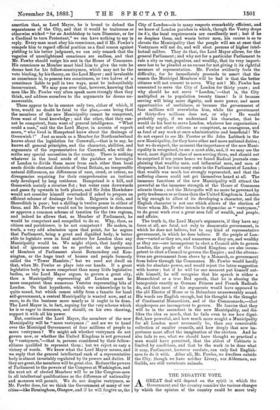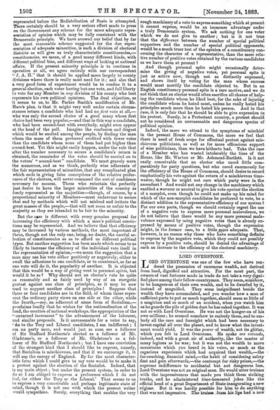THE NEGATIVE VOTE.
AGREAT deal will depend on the spirit in which the Government and the country consider the various changes by which the opinion of the country could be more truly
represented before the Redistribution of Seats is attempted. There certainly should be a very serious effort made to press on the Government any scheme for the more adequate repre- sentation of opinion which may be fully consistent ' with the Democratic principle. We have avowed our belief that by far the most reasonable scheme suggested for the due repre- sentation of adequate minorities, is such a division of electoral districts as will give us truly characteristic constituencies,— constituencies, we mean, of a good many different kinds, with different political bias, and different ways of looking at national affairs. If the present minority principle is to continue in operation at all, we agree entirely with our correspondent "J. A. H." that it should be applied more largely to county divisions where there is really most need for it ; and also that a very good form of experiment would be to confine it to a general election, each voter having but one vote, and full liberty to vote for any Member in any division of his county who best represents his own political opinions. The final objection, as it seems to us, to Mr. Parker Smith's modification of Mr. Hare's plan, is that it might very well under certain circum- stances return a candidate who had had no first vote at all,— who was only the second choice of a good many whose first choice had been very popular,—and that in this way a candidate, who had been second-best with everybody, might even appear at the head of the poll. Imagine the confusion and disgust which would be excited among the people, by finding the man whom the mass of them preferred credited with fewer votes than the candidate whom none of them had put higher than second-best. Yet this might easily happen, under the rule that after the number necessary to secure a candidate's return is obtained, the remainder of the votes should be carried on to the voters' " second-best " candidate. We must gravely warn the numerous, and as we think, perfectly wise adherents of the fair representation of minorities, that any complicated plan which ends in giving false conceptions of the relative prefer- ences of the electors, will never command the sort of confidence necessary for success. Those who entertain the perfectly just desire to have the larger minorities of the country as freely represented as the majorities—though, of course, by a proportional minority of Members—must endeavour to secure that end by methods which will not mislead and irritate the great masses of the people,—that will not seem as unfair to the majority as they are intended to be fair to the minority.
But the case is different with every genuine proposal for increasing the efficiency with which a man's political convic- tions may be represented. And we believe that that efficiency may be increased by various methods, the most important of these, though not the only one, being, no doubt, the careful se- lection of constituencies so as to afford us different political types. But another suggestion has been made which seems to us likely to increase the efficiency of the individual vote itself in the representation of opinion,—we mean the suggestion that a man may use his vote either positively or negatively, either to swell the adhesions to one candidate, or to counteract, so far as one vote will do it, the popularity of another. It is objected that this would be a way of giving vent to personal spites, but would it be so ? Why should not an elector's vote be quite as reasonably and as fairly used by way of an energetic protest against one class of principles, as it may be now used to support another class of principles ? Suppose that three or four candidates are in the field, of whom three repre- sent the ordinary party views on one side or the other, while the fourth,—say, an adherent of some form of Socialism,— proclaims loudly that he wishes for the nationalisation of the land, the erection of national workshops, the appropriation of the "unearned increment" to the advancement of the labourer, and similar proposals. Is it unreasonable for a voter to say, As to the Tory and Liberal candidates, I am indifferent ; I am no party man, and would just as soon see a follower of Sir Stafford Northcote's elected as a follower of Mr. Gladstone's, or a follower of Mr. Gladstone's as a fol- lower of Sir Stafford Northcote's ; but I have one conviction of the strongest kind that I should like to express, namely, that Socialism is mischievous, and that if we encourage it, it will sap the energy of England. By far the most character- istic form which I could give to my vote would be to make it a protest against the election of the Socialist. Indeed, that is my main object ; but under the present system, in order to do so I am obliged to express a preference which I do not feel, for either the Tory or the Liberal.' That seems to us to express a very conceivable and perhaps legitimate state of mind, though it is not one with which the present writer would sympathise. Surely, everything that enables the very rough machinery of a vote to express something which at present it cannot express, would be an immense advantage under a truly Democratic system. We ask nothing for one voter which we do not give to another ; but is it not true that the diference between the number of special political supporters and the number of special political opponents, would be a much truer test of the opinion of a constituency con- cerning the character of a representative, than the mere rela- tive number of positive votes obtained by the various candidates as we have them at present ?
And though personal spite might occasionally deter- mine the giving of negative votes, yet personal spite is just as active now, though not so distinctly expressed, and shows itself by voting for the man whose success would most mortify the candidate objected to. But in an English constituency personal spite is a rare motive, and we do not think that an elector would often sacrifice all chance of help- ing the candidate whom he liked best, for the sake of injuring the candidate whom he hated most, unless he really hated his principles much more than he hated his person. And in that case, it is only fair that he should be able to give expression to his protest. Surely, in a Protestant country, a protest should not be considered an unreasonable and dangerous species of political opinion.
Indeed, the more we attend to the symptoms of mischief in the present House of Commons, the more we feel that there is need of fresh scope for effectual protest against mis- chievous politicians, as well as for more efficacious support of wise politicians, than we have hitherto had. Take the case of a Member who has wasted intolerably the time of the House, like Mr. Warton or Mr. Ashmead-Bartlett. Is it not easily conceivable that an elector who cared little com- paratively for party questions, but who cared enormously for the efficiency of the House of Commons, should desire to record emphatically his vote against the return of a mischievous time- waster, though he might not care which party were in the ascendant? And would not any change in the machinery which enabled a waverer or neutral to give his vote against the election of a marplot, even though he could not make up his mind for which of the non-marplot candidates he preferred to vote, be a distinct addition to the representative efficiency of our system ? For our own parts, though we should certainly regret the use of a negative vote to express mere personal malevolence, we do not believe that there would be any more personal male- volence expressed by using negative votes than is already ex- pressed by means of positive votes though the expression might, in the former case, be a little lore adequate. That, however, is no reason why those who hive something definite to express by the negative vote, which they could not possibly express by a positive vote should be denied the advantage of such an increase to the efficiency of the electoral machinery.







































 Previous page
Previous page